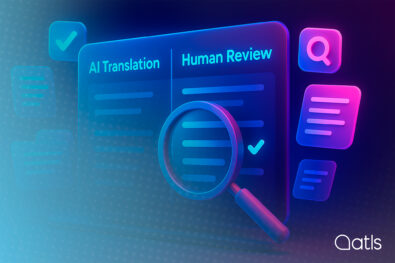For mere mortals, Halloween, Black Friday and Christmas are kind reminders that the year is drawing to an end… But if you’re an accounts person, it means it’s almost time to file your annual accounts, or translate your annual accounts if your company is operating in an international environment. You'll have a red circle around this date on your calendar - and not because it's a holiday!
In the vast world of economic translations, annual accounts are particularly prominent, thanks to their importance and often obligatory nature, so we are devoting this post to clarify why, when and how we should translate our annual accounts.
What are annual accounts?
Maybe we're preaching to the converted if you're already an accountant (and no, we're not talking about business owners), but it's always good to take some time to clarify the concepts and notions. Annual accounts are a set of accounts documents that report on a company's financial activity over the past financial year.
The accounts have numerous aims. It puts a company's financial status in black and white, simplifying the year-on-year analysis for both legal purposes and to facilitate strategic decision-making on the part of the relevant people. Making them public is also a major exercise in corporate transparency.
Annual accounts are a mandatory requirement to be filed with the Companies Register, with some exceptions (self-employed people for the most part). This means that public limited and limited liability companies, as well as partnerships limited by shares and mutual guarantee partnerships are all subject to this accounting obligation, as well as pension funds and foundations.
What are annual accounts?
The Spanish General Chart of Accounts, the legal instrument governing all aspects of a company submitting annual accounts (aligned with NIC-IFRS, the international financial reporting standards) specifies the documents annual accounts should be made up of:

- The general balance sheet
- Profit and loss accounts or income statement
- The statement of change in equity
- Cash flow statement
- The report (or notes) on the financial statement
On the other hand, there is a whole series of principles, criteria, conditions, procedures, appendices and even models (ordinary, abbreviated, for SMEs) that needs to be taken into account when preparing, submitting and evaluating each part of this comprehensive document that could well be the most important tool for a company, at least in accounting terms.
When should annual accounts be presented?
Given that annual accounts are used as a summary and analysis of an organisation's accounting development over the year, it's logical that they should be prepared at the close of the financial year, generally within the same calendar year. It's a complex process, so the submission date is the following 31st of July.
However, there are numerous prior deadlines that must be taken into account:
- 31st March: end date for drafting annual accounts.
- 31st April: end date for accounting books to be authorised.
- 30th June: date accounts presented to the company's annual meeting.
- 31st July: date accounts deposited in the Companies Register.
Why should I translate my annual accounts?
Generally speaking, there's no obligation to translate your accounts into other languages, provided that your company's headquarters are in your own country. In other words, if your company headquarters are in Spain, the accounts need to be submitted in Spain's official language - Spanish.
But what about if the company also operates in other countries, where they speak other languages? It means you'll have taken the leap onto the international stage, whether by opening a branch, subsidiary or permanent premises, etc. In these cases, you'll be required by law to submit your accounts in those countries, in their official languages.
When are annual account translations mandatory?
There are a couple of assumptions here:
- If you want to open a branch or subsidiary in a country where they speak another language, you'll be legally obliged to submit a translation of your annual accounts. For example, if your parent company is in the UK and you want to expand to Germany, you would need to present your annual accounts in German.
- Once you've established yourself abroad, in the case of branches, and sometimes in the case of subsidiaries (depending on the legislation of each country) you need to submit what are known as consolidated accounts (for the entire business group); if you're in China, it would be Mandarin Chinese.
Another major instance of the need for mandatory translation is if you're applying for international contracts, tenders or grants. The standard in these cases is that the authority concerned will request detailed financial documentation from all applicants, whether or not you have a regular presence in the geographical area the tender relates to.
Other cases in which annual account translation is advisable
But putting these obligations to one side, there are other powerful reasons to have your annual accounts translated. Here, we'll look at the two most relevant (and most obvious) reasons why it should be done by any company expanding internationally.
- On the one hand, you have the recruitment of partners and investors. It's logical that any person or organisation assessing the potential to take part in a project would want to know about a company's financial situation in detail; and if you can do it in your own language, all the better.
- On the other hand, there’s the image of corporate transparency, which we touched on briefly before. If you want your financial results to be truly accessible to an international audience, this is your finest asset. Large companies often translate their accounts, into English at least.
What type of translation do you need?
If you have ever seen (let alone produced) one of these documents, you will have realised that it involves highly complex material that requires a high level of technical expertise (not to mention the importance to the company of having accurate accounts, whether in our native language or in any other language).
And the difficulties and complexities are not insignificant. Let's list a few, the most obvious:
- To start with, both the content and form of the documents themselves must follow a long series of legal, accounting and tax standards (which, by the way, can and often do vary from country to country). It's a translator's duty to stay up-to-date.
- In this field, the terminology isn't just specialist, it can sometimes even be polysemic (an example from a Latin American Spanish - American English glossary), which can lead to unwanted ambiguity, if not downright errors.
- And, like any translation, it should sound natural and be localised for the target audience. In Spanish, the most obvious example is the American and European variants of 'annual accounts' and 'financial statements'. '€1000' or 'EUR 1,000.00'?).
- Apart from the letters, there are the figures; the 'raison d'etre' of company accounts. It requires an eagle eye and surgical precision; needless to say, this is where being accurate down to the smallest decimal point is absolutely meant in the literal sense.
- Last but not least, the question of layout, and how the document is presented. If there's one thing annual accounts all have in common, it's tables; and if there’s one thing all world languages have in common, it’s different extensions, not to mention alphabets, formats, etc.
Do annual accounts translations need to be sworn?
There's no doubt about it, annual accounts translation calls for a professional specialist who has direct experience in legal and economic translation, working with these documents in particular. Does this mean that you need a sworn translation? Let's take a look.
First of all, do you know what a sworn translator is? A definition? A professional translator authorised by the Ministry of Foreign Affairs to carry out official, legally recognised translations, effectively acting as a notary public. They're charged with verifying the annual account translation, providing their signature and stamp.
So, are accounts sworn, or not? It depends. If you’re translating your accounts for purely informative or communication purposes, to publish on your website or in an annual report for example, aiming to generate trust and loyalty among customers or users, you could opt for a simple translation, which will always be more budget-friendly.

Meanwhile, if your accounts need to be filed with a public body (as a general rule, this would be with the Companies Register or equivalent in other countries), there’s no doubt about it: you are required to have an official sworn translation, or you could run the risk of writing your accounts in the target language, if you have an expert adviser who understands the material in the source language.
Which other financial documents need to be translated annually?
Annual accounts are by far the most commonly translated financial document; logical, when you consider the obligatory nature of this international landscape, as we already mentioned. But this isn't the only financial document to be translated - not even the only one that's translated once a year.
Other documents often need to be translated for legal purposes, too. Examples include external or independent audit reports if a company is listed on the stock exchange, or if requested by shareholders or a bank to open a lending facility. It’s a similar scenario with risk management or corporate social responsibility reports.
And then there are all that materials that are often used to prepare accounts (whether translated or not). The variety is huge, depending on the sector and company's scale. It could include anything from contracts and payment methods to informative or promotional documents. For example:
- International credit cards
- Credit rating reports
- Brochures on stock market products
- Fund management reports
- Expert opinions on property valuations
- Investment plans
- Proofs of payment
- Bank guarantee agreements
- Company deed of constitution
- Tax inspection reports

Financial translation, the key to internationalisation
All these texts share certain clear and specific characteristics: they focus on the theme of finance in the broadest sense. If you're delving into the world of internationalisation, you'll come face to face with the translation of financial documents, which are very much a specialist branch of the translation ecosystem.
In fact, specialists in this field of translation (economic-financial translation) hold the key to helping you cross the international threshold, by translating economic, financial and accounting content from your language to another. They can do so because they see them on a daily basis, and are familiar with all their peculiarities.
Even native speakers can find this type of content impenetrable, don't you think? Omnipresent anglicisms and the recurrent use of recently coined acronyms and neologisms are combined with the field's characteristic economy of expression and writing style. And whilst the aim is to seek clarity, the opposite can sometimes be true of the translation.
Characteristics of a (good) annual accounts translator
If we go back to the specific example of translating annual accounts, a specialist translator brings together the qualities of an accountant who understands the field, and someone who has mastered the two languages and knows how to convey information, ideas and concepts from one to another clearly and concisely.
- At a linguistic level, they'll have a fluent grasp of the vocabulary (abbreviations, technical terms, jargon) as well as the morphological and syntactic aspects of annual accounts (for example, the use of the passive voice and impersonal tone).
- They will of course be familiar with the differences in the structure of the documents, as well as any regulatory differences (in the case of companies or corporate governance bodies, for example).
This is clear to see in the handling of tables in accounts —a basic tool of annual accounts. Finding mere equivalents between the blocks, sections, headings and items on these ‘forms' (succinct by nature) can get complicated, and the differences between countries (even those with the same language) are stark.
Even with few references and little context (as is often the case) a good financial translator will know exactly where to find information for an annual accounts translation (in databases or their own glossaries created over years of work) and which references they can be checked against.
Plus, they know when and how to use the assistance of machine translation; to achieve uniform terminology using translation memories, and avoid glaring errors in the figures using LQA, for example - but not to entrust something as important as your company accounts to a machine.
Our advice
If you have reached this point, it's because you probably need to translate your company's annual accounts. At ATLS, as a translation company spanning upwards of 25 years of experience, we have seen all kinds of mistakes that can be avoided beforehand.
Firstly, don't underestimate the task of translating the annual accounts, because although it may seem easy, it is a highly complicated process that requires specialised translation and experienced translators. A general translation is no good here!
Furthermore, if you need a sworn translation of your annual accounts, make sure that the translator has been certified as a sworn translator by the Ministry of Foreign Affairs. If you work with a translation agency, it is also vital that it has ISO 17100 quality certification, which is the most demanding seal of approval for translation quality awarded to companies in this sector.
We insist again and again (and ad infinitum): we recommend having the translation of annual accounts carried out by an experienced translation agency with translators specialised in this field. This way, you are certain not to fail 😉.
Do you need to translate your annual accounts?
Now you know that the term 'economic translation' does not necessarily mean 'a cheap translation', it's time to get to work to find someone who is an annual accounts translation specialist.
We absolutely recommend a specialist and accredited translation agency, with experience in both annual accounts and business internationalisation translation.
And we recommend an agency —not only because that’s the part we play— but because agencies above all (at least any worth their salt) use the right technological tools, and hold ISO 9001 and ISO 17100 quality certifications, as well as public liability insurance, in case, despite everything, we almost forget to dot our i’s and cross our t’s…
Frequently asked questions on annual accounts translation for 2025
What are annual accounts and why are they important?
Annual accounts are a set of accounts documents that summarise a company's financial position at the end of the financial year. Their main objective is to clearly and methodically reflect the organisation's financial history to facilitate legal and strategic analysis. They can also be used for corporate transparency purposes and are mandatory for most companies (with a few exceptions such as the self-employed).
These documents include:
- General balance sheet
- Profit and loss account
- Statement of changes in equity
- Statement of cash flows
- Notes to the financial statements
When are annual account translations mandatory?
The translation of annual accounts is not always mandatory; however, it is in the following cases:
- Opening a branch or subsidiary abroad: The translation must be submitted in the official language of the country.
- Submission of consolidated accounts for foreign branches or subsidiaries.
- Participation in international tenders, bids or grant processes where authorities usually require detailed financial documents in their language.
What type of translation is required for annual accounts? Does it need to be certified?
The type of translation depends on why it is needed:
- Simple translation: For information purposes, such as annual reports, publication on the website or to attract investors.
Sworn translation: This is mandatory if annual accounts are submitted to public bodies, such as the Companies Register or equivalent entities in other countries.
Sworn translations must be performed by a translator who has been certified by the Ministry of Foreign Affairs and must feature the translator's signature and stamp to ensure that the document is legally valid.
Why is it important for specialist translators to translate annual accounts?
Translating annual accounts is a complex process that requires technical knowledge and experience due to the following:
- Specific terminology and international variations in accounting and tax standards.
- The accuracy needed for figures and to format tables and documents.
- The need to “sound natural” in the target language, which is achieved by adapting content to its linguistic and cultural characteristics.
For this reason, we recommend that you work with a specialist translation agency that has qualified translators and quality certifications such as ISO 17100 to ensure that the translation is both accurate and professional.






